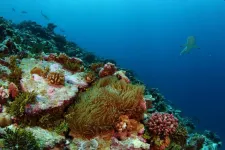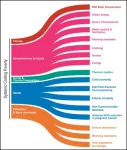(Press-News.org) Studies of a ‘future-proof’ vaccine candidate have shown that just one antigen can be modified to provide a broadly protective immune response in animals. The studies suggest that a single vaccine with combinations of these antigens – a substance that causes the immune system to produce antibodies against it – could protect against an even greater range of current and future coronaviruses.
The vaccine antigen technology, developed by the University of Cambridge and spin-out DIOSynVax in early 2020, provided protection against all known variants of SARS-CoV-2 – the virus that causes COVID-19 – as well as other major coronaviruses, including those that caused the first SARS epidemic in 2002.
The studies in mice, rabbits and guinea pigs – an important step before beginning human clinical trials, currently underway in Southampton and Cambridge – found that the vaccine candidate provided a strong immune response against a range of coronaviruses by targeting the parts of the virus that are required for replication. The vaccine candidate is based on a single digitally designed and immune optimised antigen.
Even though the vaccine was designed before the emergence of the Alpha, Beta, Gamma, Delta and Omicron variants of SARS-CoV-2, it provided a strong protection against all of these and against more recent variants, suggesting that vaccines based on DIOSynVax antigens may also protect against future SARS-CoV-2 variants.
DIOSynVax (Digitally Immune Optimised Synthetic Vaccines) uses a combination of computational biology, protein structure, immune optimisation and synthetic biology to maximise and widen the spectrum of protection that vaccines can provide against global threats including existing and future virus outbreaks. Its vaccine candidates can be deployed in a variety of vaccine delivery and manufacturing platforms. The results are reported in the journal Nature Biomedical Engineering.
Since the SARS outbreak in 2002, coronavirus ‘spillovers’ from animals to humans have been a threat to public health, and require vaccines that provide broad-based protection. “In nature, there are lots of these viruses just waiting for an accident to happen,” said Professor Jonathan Heeney from Cambridge’s Department of Veterinary Medicine, who led the research. “We wanted to come up with a vaccine that wouldn’t only protect against SARS-CoV-2, but all its relatives.”
All currently available vaccines, such as the seasonal flu vaccine and existing Covid-19 vaccines, are based on virus strains or variants that arose at some point in the past. “However, viruses are mutating and changing all the time,” said Heeney. “Current vaccines are based on a specific isolate or variant that occurred in the past, it’s possible that a new variant will have arisen by the time we get to the point that the vaccine is manufactured, tested and can be used by people.”
Heeney’s team has been developing a new approach to coronavirus vaccines, by targeting their ‘Achilles heel’. Instead of targeting just the spike proteins on the virus that change to evade our immune system, the Cambridge vaccine targets the critical regions of the virus that it needs to complete its virus life cycle. The team identifies these regions through computer simulations and selecting conserved structurally engineered antigens. “This approach allows us to have a vaccine with a broad effect that viruses will have trouble getting around,” said Heeney.
Using this approach, the team identified a unique antigen structure that gave a broad-based immune responses against different Sarbeco coronaviruses, the large group of SARS and SARS-CoV-2 related viruses that occur in nature. The optimised antigen is compatible with all vaccine delivery systems: the team administered it as a DNA immunogen (in collaboration with the University of Regensburg), a weakened version of a virus (Modified Vaccinia Ankara, supported by ProBiogen), and as an mRNA vaccine (in collaboration with Ethris). In all cases, the optimised antigen generated a strong immune response in mice, rabbits and guinea pigs against a range of coronaviruses. Based on a strong safety profile, the "first-in-human" clinical trials are ongoing at Southampton and Cambridge NIHR Clinical Research Facilities. The last booster immunisations will conclude by the end of September.
“Unlike current vaccines that use wild-type viruses or parts of viruses that have caused trouble in the past, this technology combines lessons learned from nature’s mistakes and aims to protect us from the future,” said Heeney. “These optimised synthetic antigens generate broad immune responses, targeted to the key sites of the virus that can’t change easily. It opens the door for vaccines against viruses that we don’t yet know about. This is an exceptionally different vaccine technology – it’s a real turning point.”
The research was initially funded by the DHSC UK Vaccine Network programme and later in part by the Innovate UK DIOS-CoVax programme. The DIOSynVax pipeline includes vaccine candidates for influenza viruses, haemorrhagic fever viruses, and coronaviruses including SARS-CoV-2, the latter of which is currently in clinical trials.
DIOSynVax is a spin-out company from the University of Cambridge, established in 2017 with the support of Cambridge Enterprise, the University’s commercialisation arm. Jonathan Heeney is the Professor of Comparative Pathology at the University of Cambridge, and a Fellow at Darwin College.
END
New vaccine technology could protect from future viruses and variants
2023-09-25
ELSE PRESS RELEASES FROM THIS DATE:
Racial disparities in emergency department physical restraint use
2023-09-25
About The Study: In this systematic review and meta-analysis of 10 studies, physical restraint was uncommon, occurring in less than 1% of encounters, but adult Black patients experienced a significantly higher risk of physical restraint in emergency department settings compared with other racial groups. Emergency departments should carefully consider, and take steps to address, how racism may affect disparate use of restraints among adult patients.
Authors: Vidya Eswaran, M.D., of the Baylor College of Medicine in Houston, is the corresponding author.
To access the embargoed study: Visit ...
Access to marijuana by minors via online dispensaries
2023-09-25
About The Study: This analysis of 80 online marijuana dispensaries based in 32 states found that most lacked adequate age verification features and most accepted nontraceable payment methods, enabling youth to hide their transactions. Almost 1 in 5 online dispensaries required no formal age verification at any stage of the purchasing process.
Authors: Ruth L. Milanaik, D.O., of Steven and Alexandra Cohen Children’s Medical Center of New York in Lake Success, is the corresponding author.
To access the embargoed study: Visit our For The Media website at this link https://media.jamanetwork.com/
(doi:10.1001/jamapediatrics.2023.3656)
Editor’s ...
Racial, ethnic, and sex diversity in academic medical leadership
2023-09-25
About The Study: The results of this study suggest that select specialties in academic medicine have bridged diversity gaps in academic medical leadership whereas others continue to lag behind.
Authors: Charles S. Day, M.D., M.B.A., of Henry Ford Health in Detroit, is the corresponding author.
To access the embargoed study: Visit our For The Media website at this link https://media.jamanetwork.com/
(doi:10.1001/jamanetworkopen.2023.35529)
Editor’s Note: Please see the article for additional information, including other authors, author contributions and ...
Distinct immune, hormone responses shed light on mysteries of long COVID
2023-09-25
New Haven, Conn. — People who have experienced brain fog, confusion, pain, and extreme fatigue for months or longer after being infected with the COVID-19 virus exhibit different immune and hormonal responses to the virus than those not diagnosed with long COVID, according to a new study by researchers at Yale School of Medicine and Icahn School of Medicine at Mount Sinai.
The discovery of these distinct responses can help scientists for the first time identify the causes — and potentially ...
Antiviral drug linked to SARS-CoV-2 mutations
2023-09-25
Francis Crick Institute press release
Under strict embargo: 16:00hrs BST 25 September 2023
Peer reviewed
Observational study
People
Antiviral drug linked to SARS-CoV-2 mutations
Researchers at the Francis Crick Institute, the University of Cambridge, Imperial College London, the University of Liverpool, the University of Cape Town and UKHSA have uncovered a link between an antiviral drug for COVID-19 infections called molnupiravir and a pattern of mutations in the SARS-CoV-2 virus.
Molnupiravir works by inducing mutations in the virus’s ...
Pioneering research links the increase of misinformation shared by Republican US politicians to a changing public perception of honesty
2023-09-25
The international study, published in Nature Human Behaviour, analysed millions of tweets by members of Congress over the last decade. Its findings showed both Republican and Democratic politicians were increasingly sharing their beliefs and opinions as well as evidence-based information. But among Republicans, their expression of honestly-held beliefs and opinions was strongly linked to less trustworthy information sources.
Lead author Jana Lasser, a postdoctoral research fellow in computational social science at Graz University of Technology (TU Graz), said: “We wanted to find out what reasons and social changes contribute to people sharing ...
New research reveals extreme heat likely to wipe out humans and mammals in the distant future
2023-09-25
A new study shows unprecedented heat is likely to lead to the next mass extinction since the dinosaurs died out, eliminating nearly all mammals in some 250 million years time.
The research, published today in Nature Geoscience and led by the University of Bristol, presents the first-ever supercomputer climate models of the distant future and demonstrates how climate extremes will dramatically intensify when the world’s continents eventually merge to form one hot, dry and largely uninhabitable supercontinent.
The ...
Theories about the natural world may need to change to reflect human impact
2023-09-25
New research, reported in Nature Ecology & Evolution, (25 September 2023) has for the first time validated at scale, one of the theories that has underpinned ecology for over half a century. In doing so, the findings raise further questions about whether models should be revised to capture human impacts on natural systems.
Scientists working in the 50’s and 60’s developed theories to predict the ecological distribution of species. These theories could be applied across a broad range of environments and variables such as food supply or temperature and when tested on a small scale they were found to be accurate. Amongst the earliest examples of these ...
Ocean acidification research is robust despite ebbs and flows
2023-09-25
A new objective examination of almost a quarter-of-a-century of ocean acidification research shows that, despite challenges, experts in the field can have confidence in their research.
The University of Adelaide’s Professor Sean Connell from the Ecology and Evolutionary Biology unit led the study.
“In our field, the marine science community was galvanised by the demonstration of how ocean acidification impairs shell-building life, which has profound implications for life on the planet,” ...
Systemic cooling poverty: A new facet of deprivation emerging in a warming planet
2023-09-25
OXFORD - 25/09/2023 - A new study in Nature Sustainability - published today by researchers from Oxford University, Ca’ Foscari University of Venice, the Euro-Mediterranean Center on Climate Change, the European Institute on Economics and the Environment and the London School of Hygiene & Tropical Medicine - brings attention to a new relevant dimension of deprivation which is clearly emerging in a warming world: cooling poverty. The study highlights the multidimensional nature of cooling poverty and introduces the new concept of systemic cooling ...




